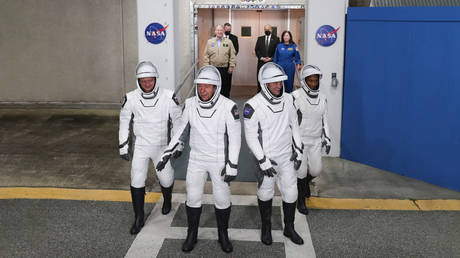ARTICLE AD BOX
The Tokyo-based Space One startup had aimed to become the country’s first private firm to put a satellite into orbit
A rocket launch attempted by Japanese private firm Space One ended in an explosion shortly after its inaugural lift-off on Wednesday. The Tokyo-based startup was seeking to become the first Japanese company to put a satellite into orbit.
Kairos, an 18-meter-long solid-fuel rocket, was carrying an experimental government intelligence satellite. The rocket exploded in mid-air five seconds after launch, with the debris falling onto a nearby mountainous area and into the sea, according to the Japan Times newspaper.
Live news footage of the event broadcast on local television showed fragments of the rocket lying on the ground, as firefighters attempted to extinguish a large fire. The blaze was put out and nobody on the ground was hurt, according to the local government.
The launch was highly automated and the rocket was programed to self-destruct if it detected errors in its flight path, speed, or control system that could cause a crash that would endanger people on the ground, Reuters cited Space One as explaining.
“The rocket terminated the flight after judging that the achievement of its mission would be difficult,” Space One president Masakazu Toyoda said.
The company did not specify what triggered the self-destruction and pledged to carry out an investigation. It didn’t say when the next launch was scheduled.
Read more WATCH SpaceX launches new Russian-US crew to ISS
WATCH SpaceX launches new Russian-US crew to ISS
Space One was set up in 2018 by a consortium of Japanese companies and, according Toyoda, aims to offer “space courier services” to domestic and international clients, with plans to launch 20 rockets a year by the late 2020s.
Last month, the Japan Aerospace Exploration Agency successfully launched its new flagship rocket, the H3, after years of delays and two previous failed attempts, which had cast doubt over Tokyo’s space ambitions. Last July, the engine of a Japanese Epsilon S rocket exploded during a test about 50 seconds after ignition. It was a modernized version of the Epsilon rocket that had failed to launch in October 2022.
.png)
 8 months ago
4
8 months ago
4








 English (US)
English (US)